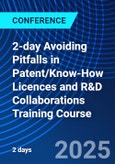This practical and interactive two-day course will cover all the important aspects of patent/know-how licences and R&D collaborations that you need to be fully up to date with.
It focusses on the pitfalls and ambiguities to be aware of and avoid in these important agreements. The expert trainer will take you through the stages of project management and guide you on how to achieve precision regarding IP definitions, ownership and use.
By giving you the knowledge of how to best approach your project you will know how to build relationships and manage the process for better outcomes.
The expert trainer tackles the issues of the academia-industry dichotomy and analyses the key aspects of patent/know-how licences and R&D collaborations, assessing the areas where things can and do go wrong.
Benefits of attending
By attending this comprehensive one-day seminar you will:
- Ensure you have the practical mastery to give you the edge in crucial IP agreements
- Analyse the key aspects of patent/know-how licences and R&D collaborations
- Assess the areas where things can and do go wrong using draft agreements
- Take away practical advice that will aid you in your day-to-day role
- Compare experiences with delegates from across Europe
There will be adequate time during the programme for discussion and to ask the expert trainer your questions.
Certifications:
- CPD: 12 hours for your records
- Certificate of completion
Agenda
Day 1
Module 1: Patent/know-how licences
Key defined terms and how to avoid traps or ambiguity
Regarding:
- Territory - being specific and carved our exceptions
- Field - fields of use, geographical exclusions, patent type exclusions, use exclusions
- Exclusivity - pitfalls to avoid and suggested solutions
- Case studies, examples and discussion
Key financial terms including ‘royalties’, ‘offsets’ and ‘milestones’
- The key aspects of provisions covering milestones and royalties
- Scope of licence and non-competition provisions - pitfalls to avoid and suggested solutions
- Liability and dispute resolution - suggested graduated dispute resolution steps, avoidance of conflict clauses
- Case studies, examples and discussion
Common pitfalls - part 1
- Defining the licensed IP - pitfalls and suggested solutions
- Licences of improvements - essential terms regarding foreground IP rights and responsibilities
- Case studies, examples and discussion
Common pitfalls - part 2
- IP warranties - essential IP and Data Protection warranties for every contract
- Dispute resolution - advantages and disadvantages of different resolution procedures
- Case studies, examples and discussion
Final questions for day one
Day 2
Module 2: R&D collaborations
Key clauses in the contract
- Each party’s aims - understanding and negotiating
- Allocation of responsibility - where the responsibility and risk lie and how it can change with different wording
- Background IP applied - essential terms regarding background IP rights and responsibilities
- Plans for foreground IP - essential terms regarding foreground IP rights and responsibilities
- Case studies, examples and discussion
Frequently encountered issues and suggested solutions
- Role of the grantor
- Project coordination
- Letting problems fester
- Diverging agendas
- The solution
- Case studies, examples and discussion
Common pitfalls - part 1
- Confidentiality vs publication - the conflict between industrial aims and academic aims
- Patenting vs sharing - some suggested compromise solutions
- Herding diverse stakeholders - the differing objectives of the parties involved in IP development
Common pitfalls - part 2
- Change of control or key personnel - common problems encountered and suggested solutions
- National idiosyncrasies - examples
- Case studies, examples and discussion
Final questions
Speakers

Richard Brady,
British Legal CentreRichard Brady is a lawyer who has spent many years working in Europe and the Middle East in the legal, financial and insurance arenas. He has a degree from Cambridge College of Teachers (2005) on Teaching English and founded the British Legal Centre in 2010. He has taught professional legal skills in many companies around the World, including Deloitte and Touche, EY, White & Case, Baker McKenzie, Shalakany Law Office, DLA Piper and Clifford Chance. He has also conducted live training courses at legal departments of corporations, including: Shell Oil, Master Foods, Air Liquide, DAMAC (Dubai), ENKA (Turkey) EMBRACO/Whirlpool (Brazil), and Mowasalat (Qatar).
His specialist areas include contract law, contract drafting, M&A in the pharma industry, arbitration law and FIDIC contracts.








